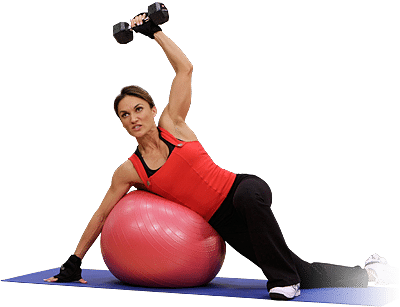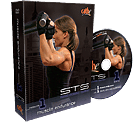STS Home About Tour Previews Pricing FAQ

STS brings a unique, quality health club workout into the privacy of your own home.

What is STS?
STS stands for Shock Training System and is based on four of the most important training principles in strength training: periodization, muscle confusion, one rep max and progressive overload. STS has been designed using the latest research and is a 3 month strength training program featuring a different exercise routine every time you work out.
Workouts like STS are very commonly guided by personal trainers and athletic coaches for their clients and athletes, but due to the overall magnitude time and expense of filming 40 workouts, it is quite considerable to understand why nobody has a made a similar program for the home exerciser until now.
STS brings a unique, quality health club workout into the privacy of your own home by maximizing the use of periodization, progressive overload, muscle confusion and one rep max testing.
STS Quality
To make STS we teamed up with some of the world’s best talent, including NFL Films and a highly accomplished team of 16 nationally known music composers who spent eight months creating and scoring over hundreds of pieces of music to every exercise and break in STS to give it a truly unique and powerful sound.
The filming and editing of STS was done at a standard normally only seen in major movie productions and we can’t thank NFL Films enough for the tremendously outstanding job they did in filming and editing the 41 STS workouts. The multiple camera angles, great close ups and meticulous editing puts STS into class of its own.Back to Top
Science of STS
STS stands for Shock Training System and is based on three of the most important training principles in strength training: periodization, muscle confusion and progressive overload.
Periodization
Periodization is a way of planning, organizing and varying your training program over time to bring about optimal gains in your physical performance. Numerous research studies have been done that clearly show that exercisers who follow a periodization–based workout get superior results when compared to exercisers who don’t follow a plan of this type.
STS has been designed to be a 3½ month linear periodization program featuring three workout cycles called mesocycles, each lasting four weeks. Each mesocycle will have a different purpose, with the first cycle focusing on muscle endurance, the second on hypertrophy and the third on strength.
You will do a different workout every week for a total of 12 weeks along with an active recovery week between mesocycles to help your body rejuvenate and prepare for the next cycle. Since this is a linear periodization program, each mesocycle is designed so that the intensity (weight lifted) increases from the previous cycle and the volume (sets and reps) decreases.
Muscle Confusion
Muscle confusion is the principle of constantly changing your workout routines to keep your body’s muscles always guessing and challenged in different ways. Muscles should never be allowed to adapt to an exercise to the point where the exercise is no longer effective and not resulting in hypertrophy or the goal you desire. Instead, a well designed exercise program that utilizes muscle confusion varies the workout routine’s exercises, sets, reps and intensity to keep your muscles growing. This also helps to avoid plateaus and boredom.
The advantage of STS is to maximize muscle confusion by not only giving you a different workout every week, but also by varying the intensity and volume of the workout over the entire program by utilizing periodization. Muscle confusion is one of the most important rules of strength training and no other workout program on the market today utilizes this principle to the same degree as STS.
One Rep Max (1RM)
Your one rep max (1RM) is the maximum amount of weight you can lift one time for any exercise. In the STS program we will demonstrate a method to easily and safely estimate your 1RM for every exercise in the program. Once you know your 1RM for each exercise, you can quickly and easily determine the correct weight to use for each exercise in every mesocycle and week of the STS series. Knowing the correct weight to use for every exercise is extremely important and will help you obtain the results you’re striving for, both safely and quickly.
Progressive Overload
Progressive overload is the gradual increase of intensity placed upon your body during a workout over a period of time. This means that in order for your muscles to grow, you need to continually challenge your body by increasing the intensity of your workout in very small steps. In STS you will start the first week of Mesocycle 1 using weights that are only about 60% of your one rep max (1RM). Then every week, except week #3, you will slowly and gradually increase your weights by about 5% so that by the time you finish the program you will be using heavy weights that are up to 90% of your 1RM.Back to Top
Workout Overview
STS is a three–day–per–week strength training program. Each week you will do two upper body DVDs and one lower body DVD. We suggest you allow at least one day off between STS workouts to allow your body adequate time to recover (e.g., workout on M–W–F or T–Th–S). You may, and should, do your favorite cardio workouts on off days. If necessary you may do any upper body and lower body workout on consecutive days, or even double up your cardio and STS workouts on the same day. Please visit our online Workout Manager program for suggested rotations on how you can easily mix your cardio workouts with your STS program. STS is divided into three mesocycles. Each mesocycle consists of four weeks of workouts. After completing each mesocycle you get to take one week off from the STS program to enjoy an active recovery week. This will help your body to recover and to prepare for the next and more intense mesocycle that follows.Back to Top
Mesocycle One

Mesocycle One is all about muscle endurance. You will lift weights that are 60–70% of your 1RM during these four weeks. Each week will feature a different workout for every muscle group. Your rep range will be around 15 reps or more for most exercises, but to total failure for many others like pushups, pull ups and band work. This cycle is divided into three muscle groupings with four workouts per grouping:
- Chest, Shoulders and Biceps
- Back and Triceps
- Legs
These nonstop workouts are sure to test the endurance of even an advanced exerciser and feature training concepts like drop sets, 21s and rest periods of 30–45 seconds between exercises. You will do one set for each muscle group and have only about 30 seconds of rest before moving on to the next body part.Back to Top
Mesocycle Two

Mesocycle Two focuses on hypertrophy, or more simply, muscle building and definition. You will be lifting a weight that is 70–80% of your 1RM during these four weeks. Once again, each week will feature a different workout for every muscle group. Your rep range will be around eight to twelve reps for most exercises and because of the increased intensity you will need a longer rest break of 60–90 seconds between sets. The one exception to this is the leg routine where you will do three tri-sets each for three rounds. Your only rest will come after completing one round of each tri–set. The leg routines in this mesocycle will be very tough.
Training concepts such as double wave loading and back off sets will be used to push you like never before. This cycle is divided into three muscle groupings with four workouts per grouping:
- Chest, Shoulders and Biceps
- Back and Triceps
- Legs
Unlike Mesocycle 1, Mesocycle 2 works each body part until completion before moving on to the next body part. In other words you will do all of your chest exercises before moving on to shoulders. You will then complete all of your shoulder exercises before moving on to triceps and so on.Back to Top
Mesocycle Three

Mesocycle Three is all about strength and is divided into the following three muscle groupings with four workouts per muscle grouping:
- Chest, Shoulders and Biceps
- Back and Triceps
- Legs
You will lift weights that are 80–90% of your 1RM during these four weeks. Your rep range will be around six to eight reps for most exercises and because of the increased intensity you will need a longer rest break between sets of the same muscle group than you did in the previous mesocycles. To reduce the amount of downtime, the upper body muscle groups are arranged in this series so that you’re alternating between push and pull muscle groups. This method will allow your different muscle groups to always have at least two to three minutes of rest, which research shows is the minimum necessary time to replenish the body’s various energy cycles needed for a high intensity workout.
This strength cycle will feature a method of training called the 5% method. To take full advantage of this technique you will want to select the heaviest weight you can lift for about nine reps. The first week you are going to do four sets of eight reps for every exercise, resting two to three minutes between each set of the same muscle group. Do the same for weeks two and three, but increase your weight by 5% for each workout and decrease your reps by one. On your fourth and final workout for this mesocycle, you will do eight reps again, just as in week one, but you’ll use the weight you used in your second workout. If everything goes as planned you should be 5% stronger at the end of this mesocycle.
You’re probably wondering how you’re going to be able to lift weights for the lower body in this rep range and intensity level. You need at least a squat rack to safely train the lower body at this intensity level, and that is why we have included two different leg workout program options for each week of this mesocycle. The Plyo–Workout is for those who don’t own a squat rack and will focus on explosive strength utilizing plyometric moves mixed with traditional leg strength training exercises. It will not follow the 5% method for strength.
If you wish to follow a true strength program and want to follow the same 5% method used in the upper body workouts in this cycle, then select the Squat Rack workout option. There are two ways to do the workouts when selecting this option. The first and best way is to use a squat rack with safety catches and a spotter. Two members of the cast are shown doing this in all four squat rack workouts. The other way to do these routines are to wear a weighted vest (usually available at most stores from 10–40 pounds) and use a short and lighter barbell like we normally use in the other segments of STS. This still may not be enough weight for some people to exactly follow the 5% method, but nevertheless it will give you an outstanding and challenging workout. The purpose of the weighted vest is to lessen the amount of weight you need on your barbell. This is beneficial because in an exercise like a squat (without a rack) you are limited by the weight you can safely lift overhead, not by the amount you can squat.Back to Top
Ab Circuits

Ab Circuits was designed to specifically coincide with the STS shock training program. Expect to “shock” your entire core/abdominal region with the following various workout programs: Yoga–Based Abs, Pilates–Based Abs, Stability Ball Abs, Medicine Ball Abs, Plate and Weight Based Abs, and even Bonus Medicine Ball with a Partner Abs (although this one is an added option). You’ll love the varied balance and strength challenges each workout provides. The best part of all is that there is something for everyone as well as everything for someone. For best results do two or three different workouts per week. Enjoy them after your STS workouts or simply on their own. Either way, the results are yours!
Ab Circuits contains the following seven ab routines:
- Yoga-Based Abs
- Pilates-Based Abs
- Weights and Plates Abs
- Stability Ball Abs
- No Equipment Abs
- Medicine Ball Abs + Bonus Medicine Ball with a Partner Abs
- Bonus Medicine Ball with a Partner Abs Only
Users Guide

As long as you order the complete STS program your order will come with a Free 112 page user guide that will contain details about every workout and DVD in the STS series as well as how to properly do the entire STS program. Those not purchasing the entire STS program may purchase the STS Users’ Guide for $24.99.
The STS Users’ Guide will help guide you through the STS program and will help you to understand how and why the STS program is constructed the way it is.
The Users’ Guide contains details about every workout in the STS series. Each workout has a table showing each exercise along with a picture of the exercise as well as other details like reps, muscle group worked, equipment needed, workout length, etc.
Other information in the STS Users’ Guide includes the exercises you need to do a 1RM test for. We even rank the importance of performing a 1RM test by giving each exercise a ranking of 1 through 5 stars and listing the equipment needed for the exercise.Back to Top
What’s included with this discount package?
- STS mesocycle #1 (12 DVD set)
- STS mesocycle #2 (12 DVD set)
- STS mesocycle #3 + all 4 Leg – Squat DVDs (16 DVD set)
- STS User’s Guide
- *Ab Circuits is not included in this discount bundle, but may be purchased separately for only $22
You may also order STS by the mesocycle.
As with all our DVDs all sales are final and we don’t allow returns. This option is only available for credit card users. Prices don’t include sales tax for New Jersey residents or international shipping rates.
